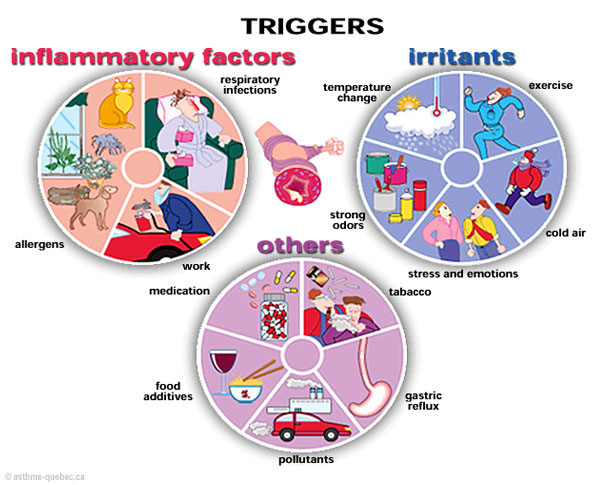
Asthma is defined as a chronic inflammatory disease of the airways that transmit air to and fro from the lungs. People suffering from chronic asthma are called asthmatic. The symptoms may vary from person to person. They can be mild, moderate or sometimes severe.
These symptoms are varying in intervals. These can arise from time to time or sometimes do not appear for long episodes.
Asthma is characterized by various symptoms such as:

- Gasping
- Coughing (chronic)
- Breathlessness
- Tightness in chest or discomfort
- insomnia(due to coughing or puffing)
Asthma is not a contagious disease. It can be hereditary in many cases. It has been observed that around 3/5th of all the asthmatic cases are inherited. If one of your parents has asthma or allergy you have more chances to develop it too.
The symptoms of asthma in elderly people are same as in adults. The only difference that can be seen is in the number of medicines needed for them to control the breathing. They need more dosage of medication as the risk of developing respiratory failure is more in old age.
In children, the symptoms are the same as adults. In some asthmatic children coughing is the only symptom seen. Boys have greater chances of asthma during childhood than girls.
According to some experts, the airway size in boys is smaller than girls that can lead to breathing problems. After puberty, the trend gets reversed. According to a study conducted for girls between ages
8 to 17 it was found that girls whose menstruation started early developed more severe asthma symptoms due to the hormonal changes occurring in puberty.
Diagnosis
The exact cause of asthma is still unknown but is believed to be caused by genetic influences along with environmental factors.
The diagnosis is done based on the symptoms and response given to the treatment over a period. A special breathing test called spirometry is done to measure the performance of a patient's lungs.
The person is asked to take a deep breath and then blow into a sensor which measures the amount of air held by the lungs. The speed of air inhaled and exhaled by the person is also measured.
This test is used for detecting the severity of asthma and the outcome of treatment. The clinical classification of asthma is done as per the frequency of symptoms into:
- (FEV1 ) Forced Expiratory Volume in one second.
- Peak Expiratory Flow rate.
Asthma is also classified as:
- atopic (extrinsic)
- non-atopic (intrinsic)
Atopic a tendency to develop immediate hypersensitivity reactions (allergic) to certain substances like dust, insects, pollen grains and dander subsequently followed by asthma flare-ups, fever or other allergic conditions.
Non- atopic asthma is caused due to smoke, weather fluctuations, cold, and pollution in the air. Asthma attacks can be worse during cold or after exercise. Stress can also lead to asthma.
Asthma and Women
As per a study conducted by researchers, it is concluded that women are more likely to suffer from breathing problem and are more likely to die from an asthma attack than men due to the fluctuations in hormones during menstruation, pregnancy, and menopause.
The changes occurring in the body affects the breathing pattern in women. It is important for them to manage the effects of estrogen (female hormone) imbalance on asthma. The shifting estrogenic levels lead to activation of proteins which in turn produce an inflammatory response leading to asthma. Preventive Measures to be taken by Women:
During Periods
You can write down about the asthma symptoms during the full month in detail and have a comparison with the pattern during the menstrual cycle. It will help you to find out the relation between your periods and asthma. You can show this report to your allergist. Discuss the remedies with your doctor and take recommended preventive medicines regularly.
In severe case, hormonal therapy is suggested. Women suffering from asthma attacks before or after periods can be benefited from this therapy. Stay away from anything that may set off asthma triggers which can be cold air, pollutants, dust, smoke or exercise.
Avoid the company of smokers as second-hand smoke can also trigger an asthma attack. Some women are also allergic to aspirin. It is better to be prepared with a rescue inhaler all the time during periods.
During Pregnancy
You can have a healthy pregnancy even if you have asthma. But you need to keep it under control. As per the American Lung Association, it is estimated that in pregnancy 1/3rd of asthmatic women have better symptoms of asthma, 1/3rd have worse symptoms and 1/3rd have stable symptoms.
Women with changes in asthma symptoms during pregnancy, return to their original status after delivery. Women whose asthma gets worsen during pregnancy are advised to take medications because the absence of treatment can deprive the fetus of oxygen posing threat to the child and mother as well. Some women show resistance to medicines out of fear of any damage to the fetus but they should not be concerned about the side effects.
During Menopause
Premenopausal asthma is developed in women due to the sudden rise and fall in estrogen levels. The symptoms are much similar to other forms of asthma resulting in coughing, pain in chest and breathlessness.
It can be controlled by avoiding the intense falls in hormones which are responsible for inflammation. With your doctor's consultation, you can opt for temporary hormone replacement therapy.
Asthma Treatment:
There is no permanent cure for asthma other than controlling the symptoms. Inhaled corticosteroids are usually used for reducing the inflammation. These steroids reduce the swelling of bronchial tubes which allows smooth breathing. Bronchodilator or leukotriene modifiers are other options for opening airways.
A bronchodilator is also available in the form of an oral pill. Albuterol or ipratropium can be taken for short-term relief. These are bronchodilators that activate instant relaxation of muscles in the airways and increase the air flow through lungs thus allowing the person to breathe freely. You should not go for albuterol if you are allergic to this medicine.
Always consult a doctor before taking this medicine especially in certain health problems like high blood pressure, heart disease, epilepsy, diabetes or overactive thyroid. It is not known whether albuterol affects pregnant women or fetus. But you should avoid breastfeeding if using albuterol. The inhaler should not be used by children younger than 4 years of age.
As per the new study a new inhaled drug, quilizumab has the capacity to treat mild asthma and allergies by causing an interruption in the production of immunoglobulin type E (IgE), responsible for triggering asthma. It targets the blood cells producing IgE protein.
Natural remedies
- Chinese traditional medicines are being used for many years to treat asthma. The herb ginkgo interrupts the protein in the blood that causes airway spasms.
- Turmeric powder if taken in warm milk three times a day can treat inflammations. You can also go for capsules and tinctures of Turmeric.
- Omega-3 fatty acids which are commonly found in fish like salmon, tuna, and mackerel, act as asthma drugs. They discontinue the body compounds actions causing inflammation in airways. Capsules in divided doses can also be taken on a daily basis.
- Capsules of Evening primrose oil if taken three times a day can avoid inflammation. Consume them along with meals to prevent stomach upset.
- Magnesium relaxes the muscles of the upper respiratory tract. 600 milligrams of magnesium tablets as per the recommended dose in a day can make better.
- Consume nutritious foods to increase immunity against bacterial and viral infections.
- Take 5 to 6 cloves and boil them in half a glass of water. Add a spoon of honey in it. It serves as a decoction for asthma. Take 2 times a day.
- Consume dried grapes soaked in water or milk on an empty stomach. Grapes give strength to the lungs and removes toxins from your body.
- Honey and olive oil added to warm milk in equal measures can be consumed along with few cloves and garlic early morning before having your breakfast for asthma cure.
- Consume fennel seeds regularly for detoxifying the lungs.
- Gooseberry when added in the crushed form to one tablespoon of a honey act as a natural remedy for asthma.
Increase in Asthma in Metro Cities due to Environmental Factors
Indoor pollutants and irritants act as triggers in asthmatic attacks. These triggers cause an episode or sometimes severe attack in patients. Identification of triggers is important to prevent the asthmatic attack. These triggers can be fumes from cleaners, smokes from chimney or cigarette, paints or dust.
Environmental factors also act as a culprit in developing asthma, especially in metro cities. These can be sulfur dioxide, ozone, cold weather, fog or pollen grains. Asthma symptoms are greatly seen during substantial air pollution phases.
Ozone in smog causes shortness of breath and coughing and pain in the chest. Sulfur dioxide, another component of smog, aggravates the airways and blocks air passages, which leads to asthma attacks.
Similarly, gas stoves expel nitrogen dioxide causing, asthma attacks, breathing problems and hay fever especially in people associated with cooking gas.
Cigarette smoking or exposure to cigarette smoke in adolescents can lead to asthma. Go for exercise in a park or a place away from roadways or highways. Avoid going outside when the pollution rate is high. Plan outdoor activities during morning or evening as ozone levels are low during these timings.

Add new comment